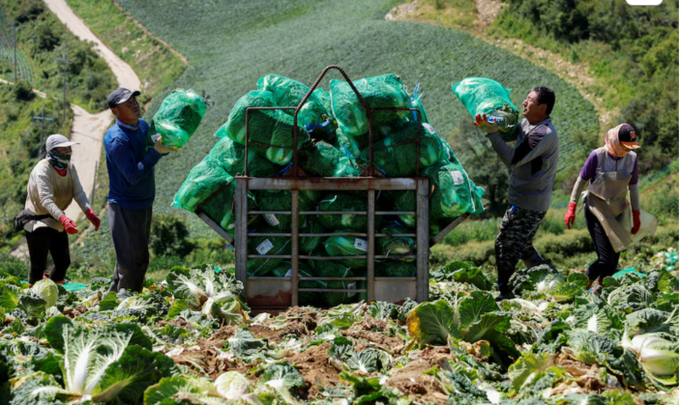May 17, 2025 | 18:58 GMT +7
May 17, 2025 | 18:58 GMT +7
Hotline: 0913.378.918
May 17, 2025 | 18:58 GMT +7
Hotline: 0913.378.918

Farmers place packaged kimchi cabbages on a container at the Anbandeogi village's kimchi cabbage field in Gangneung, South Korea, August 22, 2024.
South Korea's famous kimchi is falling victim to climate change, with scientists, farmers and manufacturers saying the quality and quantity of the napa cabbage that is pickled to make the ubiquitous dish is suffering due to rising temperatures.
Napa cabbage thrives in cooler climates, and is usually planted in mountainous regions where temperatures during the key growing summer season once rarely rose above 25 Celsius (77 Fahrenheit).
Studies show that warmer weather brought about by climate change is now threatening these crops, so much so that South Korea might not be able to grow napa cabbage one day due to the intensifying heat.
"We hope these predictions don’t come to pass," plant pathologist and virologist Lee Young-gyu said.
"Cabbage likes to grow in cool climate and adapts to a very narrow band of temperatures," Lee said. "The optimal temperatures are between 18 and 21 Celsius."
In the fields and in kitchens - both commercial and domestic - farmers and kimchi makers are already feeling the change.
Spicy, fermented kimchi is made from other vegetables such as radish, cucumber and green onion, but the most popular dish remains cabbage-based.
Describing the effect of higher temperatures on the vegetable, Lee Ha-yeon, who holds the designation of Kimchi Master from the Agriculture Ministry, said the heart of the cabbage "goes bad, and the root becomes mushy."
"If this continues, then in the summer time we might have to give up cabbage kimchi," said Lee, whose title reflects her contribution to food culture.
Data from the government statistics agency shows the area of highland cabbage farmed last year was less than half of what it was 20 years ago: 3,995 hectares compared to 8,796 hectares.
According to the Rural Development Administration, a state farming think tank, climate change scenarios project the farmed area to shrink dramatically in the next 25 years to just 44 hectares, with no cabbage grown in the highlands by 2090.
Researchers cite higher temperatures, unpredictable heavy rains and pests that become more difficult to control in the warmer and longer summers as the cause for the crop shrinkage.
A fungal infection that wilts the plant has also been particularly troublesome for farmers because it only becomes apparent very close to harvest.
Climate change adds to the challenges facing South Korea's kimchi industry, which is already battling lower-priced imports from China, which are mostly served in restaurants.
Customs data released on Monday showed kimchi imports through the end of July was up 6.9% at $98.5 million this year, almost all of it from China and the highest ever for the period.
So far, the government has relied on massive climate-controlled storage to prevent price spikes and shortages. Scientists are also racing to develop crop varieties that can grow in warmer climates and that are more resilient to large fluctuations in rainfall and infections.
But farmers like Kim Si-gap, 71, who has worked in the cabbage fields of the eastern region of Gangneung all his life, fear these varieties will be more expensive to grow in addition to not tasting quite right.
"When we see the reports that there will come a time in Korea when we can no longer grow cabbage, it was shocking on the one hand and also sad at the same time," Kim said.
"Kimchi is something we cannot not have on the table. What are we going to do if this happens?"
(Reuters)

(VAN) Fourth most important food crop in peril as Latin America and Caribbean suffer from slow-onset climate disaster.

(VAN) Shifting market dynamics and the noise around new legislation has propelled Trouw Nutrition’s research around early life nutrition in poultry. Today, it continues to be a key area of research.

(VAN) India is concerned about its food security and the livelihoods of its farmers if more US food imports are allowed.

(VAN) FAO's Director-General emphasises the need to work together to transform agrifood systems.

(VAN) Europe is facing its worst outbreak of foot-and-mouth since the start of the century.

(VAN) The central authorities, in early April, released a 10-year plan for rural vitalization.

(VAN) Viterra marked a significant milestone in its carbon measurement program in Argentina, called Ígaris, reaching 1 million soybean hectares measured.